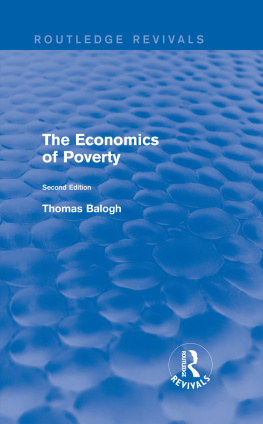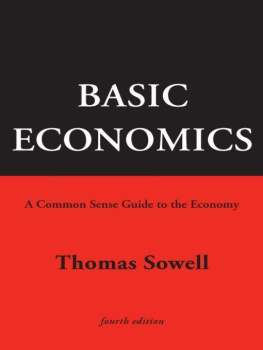The Economics of Poverty
The Economics of Poverty
Thomas Balogh
Second Edition
First published 1966 in Great Britain by Weidenfeld and Nicolson and published 1974 in U.S. by International Arts and Sciences Press, Inc.
Reissued 2018 by Routledge
2 Park Square, Milton Park, Abingdon, Oxon OX14 4RN
711 Third Avenue, New York, NY 10017, USA
Routledge is an imprint of the Taylor & Francis Group, an informa business
Copyright 1966, 1974 by Thomas Balogh
No part of this book may be reprinted or reproduced or utilised in any form or by any electronic, mechanical, or other means, now known or hereafter invented, including photocopying and recording, or in any information storage or retrieval system, without permission in writing from the publishers.
Notices
No responsibility is assumed by the publisher for any injury and/or damage to persons or property as a matter of products liability, negligence or otherwise, or from any use of operation of any methods, products, instructions or ideas contained in the material herein.
Practitioners and researchers must always rely on their own experience and knowledge in evaluating and using any information, methods, compounds, or experiments described herein. In using such information or methods they should be mindful of their own safety and the safety of others, including parties for whom they have a professional responsibility.
Product or corporate names may be trademarks or registered trademarks, and are used only for identification and explanation without intent to infringe.
Publishers Note
The publisher has gone to great lengths to ensure the quality of this reprint but points out that some imperfections in the original copies may be apparent.
Disclaimer
The publisher has made every effort to trace copyright holders and welcomes correspondence from those they have been unable to contact.
A Library of Congress record exists under LC control number: 73090495
ISBN 13: 978-1-138-89708-3 (hbk)
ISBN 13: 978-1-315-17898-1 (ebk)
I wish to express my gratitude to Dom Mintoff and to (the late) Norman Manley. It has been a great privilege to serve them and an invaluable opportunity to gain experience, under a microscope so to speak, of the varied problems facing countries whose production and income have lagged behind those of the privileged, mainly North Atlantic, regions of the world. Also I am greatly indebted to Dr Sen. The opportunity of working at the FAO during his director-generalship provided me with great intellectual stimulus; equally so in respect of my stay at the Economic Commission for Latin America under Dr Prebisch and Louis Swenson, and with CEMLA in Mexico. To my work with Professor Mahalanobis and Pitambar Pant now both dead and Ren Dumont I owe more than can be acknowledged. Dr Sir S. Ramgoolam and Mr Boollel of the government of Mauritius gave me an opportunity to study yet another problem area, as did the United States Special Fund, and especially Paul Marc Henry. I have received much encouragement from Professor Saraceno and his eminent team in Svimez who were responsible for first bringing the problem of regional handicap to the attention of the world and for securing action. I am equally grateful to Mr Dhusis and M. Couvelis of the constitutional Greek government, and to Professors Perroux and Weiller. My debt to Paul Streeten and Dudley Seers, with whom I worked for almost a score of years, transcends the limits which can be accurately acknowledged. Miss T.C. Cooper very kindly helped to select and edit these essays. Without her help this volume could not have been published and I most gratefully acknowledge my debt to her.
In preparing this second edition of The Economics of Poverty I have omitted all of the reprints of my various country reports ranging from the Mediterranean, to Africa and India. Although the basic problems which I then analysed still remain, alas, and while I am fully confident in my anti-mechanistic approach to the economies of the less developed countries, these reports would need to be brought up-to-date. This, however, is not a task that can be accomplished satisfactorily from afar, nor on the basis of the lightning visits to airports to which more fashionable experts now seem to be restricted.
Although two of the newly included chapters () concerns what I regard as having become the most urgent of questions, the reform of planning for development and aid administration. These points are also taken up in a new and lengthier Introduction.
I wish to express my gratitude to Queen Elizabeth House and to its Warden, Paul Streeten, who provided me with a research home; to my colleague, Mr Peter Balacs, whose editorial work well exceeded the limits connoted by that term and who helped to clarify obscure passages; and to the Social Science Research Council, whose grant enabled me to undertake much of the work embodied in this volume. The Leverhulme Trust, the ODA and the Fund for Studies in Social and Economic Change generously enable me to continue this work. I owe grateful thanks to them.
The Tides of Fashion
For well over a century and a half it has been taken for granted by most economists that 'qualitative conclusions about the effect of an economic cause upon economic welfare will hold good also of the effect on total welfare'. In the end, most economists adopted the size and growth of national income as a valid criterion for policy.
Lately, however, there has been a multiple reaction to this view. Not only have the implications of inequality in the distribution of consuming power been stressed far more forcefully than before,which play such an important part in less developed areas.
Beyond that, the effect of 'development', as conventionally measured, on social institutions had been almost completely neglected. It was hopefully postulated that the only sure way to 'prosperity' lay in the imitation of North Atlantic and especially British institutions. It must be admitted, however, that even in those cases where independence was granted after a bloody and prolonged rebellion or civil war as in Algeria the same elitist deterioration can be observed.
although if it is the rich who alone or mainly benefit from this progress, and if there is no impulse towards its broadening and self-perpetuation, the political consequences of 'development' might be disastrous.
The Aid Controversy
This leads me to a second basic attack on the view, which I had not dealt with in 1964 when the first edition of this volume was being prepared by Miss Cooper. This attack is based neither on the notion that economic progress might have serious drawbacks, nor that it might not be measurable in the traditional fashion, but on the denial that it can be accelerated by means of foreign assistance. In this matter les extrmes se touchent. Mr Griffin, the most downright of the progressive critics of aid, In these, as in other economic matters, it would be rash to lay down general rules, although deterrent examples should alert both contributors and recipients to the various severe pitfalls in the way of development; I shall return to this important point.
The right-wing critics of foreign assistance, on the other hand, point to its deleterious moral effects in much the same way as those who in the nineteenth century advocated reform of the Poor Laws, and their linear successors, the critics of unemployment benefit, attacked the rise of the Welfare State for encouraging 'malingerers and scroungers'. Further, they argue that aid would increase the size of the public sector relative to the private sector, allow wasteful public expenditure, and distort the structure of the economy. The bureaucracy would be permitted to lord it over an upward-thrusting entrepreneurial class labouring under a progressive tax system destructive of incentive. The upshot and the direct consequence of aid would be decay. The irresponsible bureaucracy would then wreak vengeance on the innocent would-be entrepreneurs: compulsion would follow control, and poverty and suffering would be aggravated.been handed over to the private sector, development might have occurred along those lines which brought flowering to the industrializing countries of the North Atlantic and Japan. Laissez-faire and all would be done!














